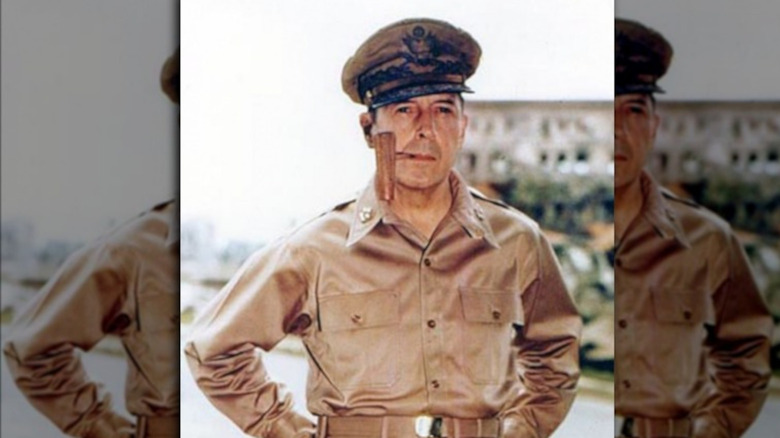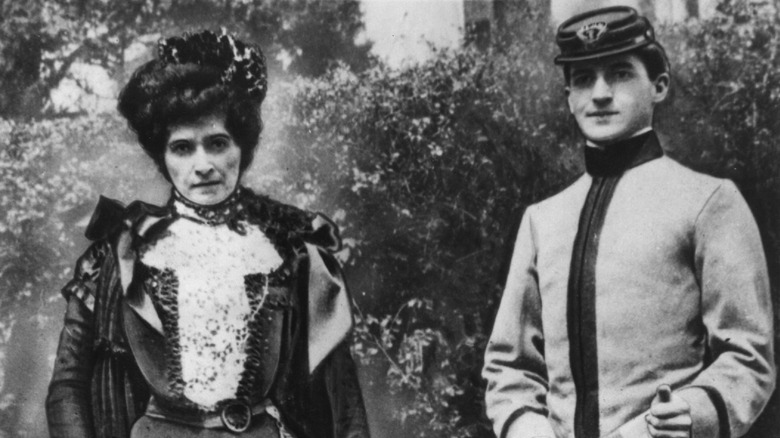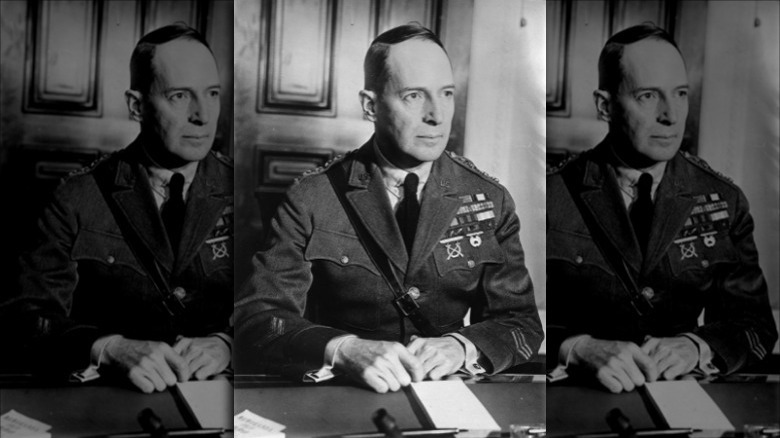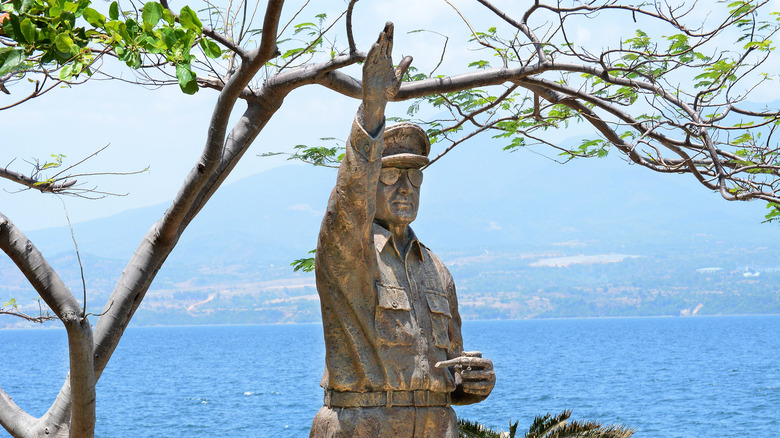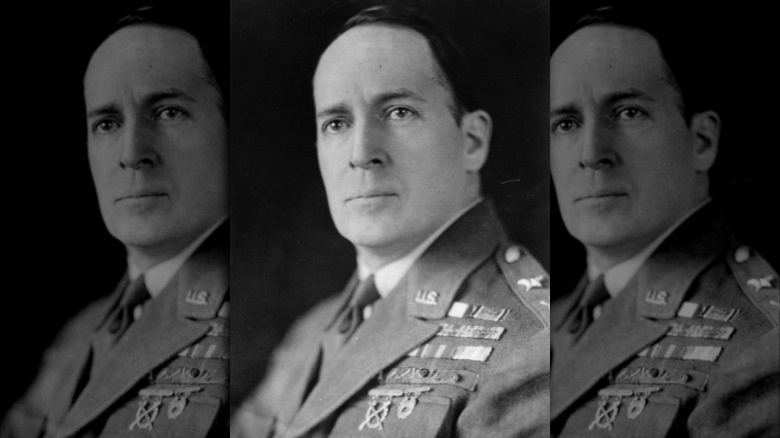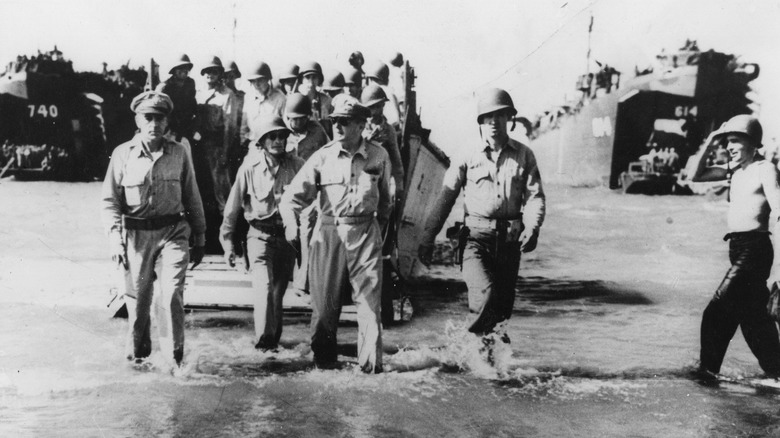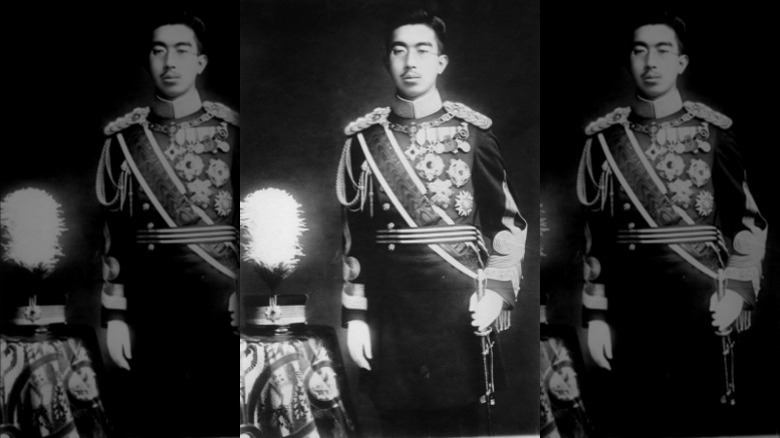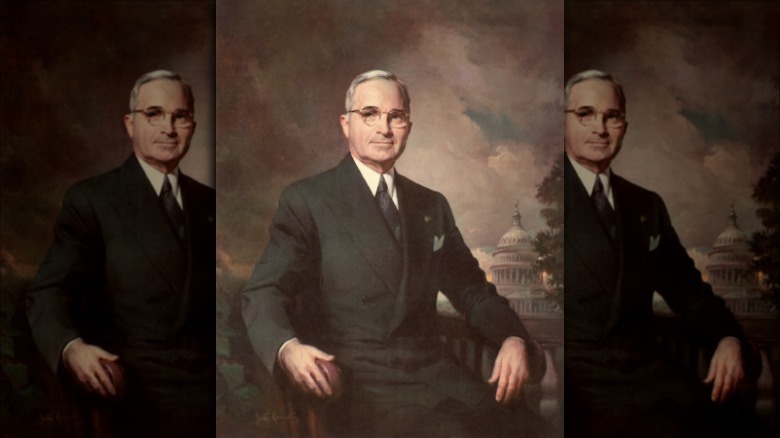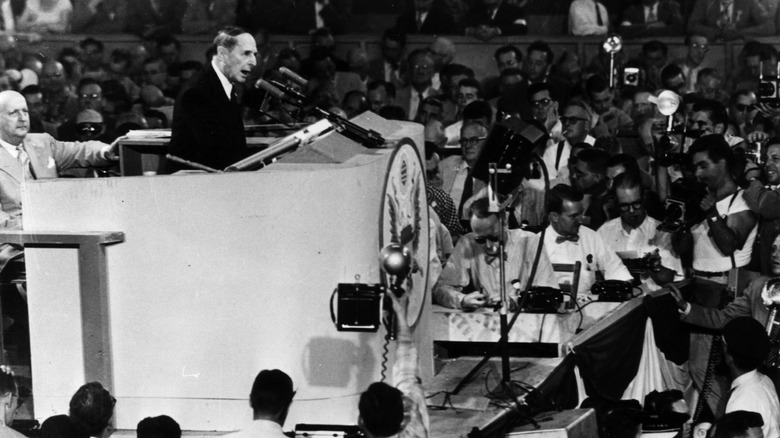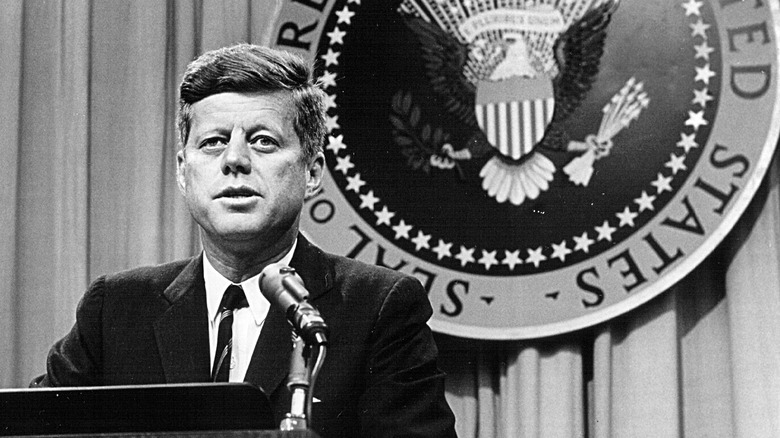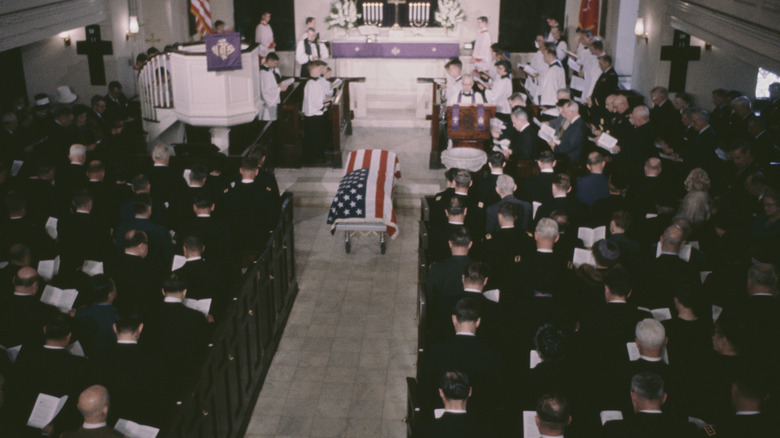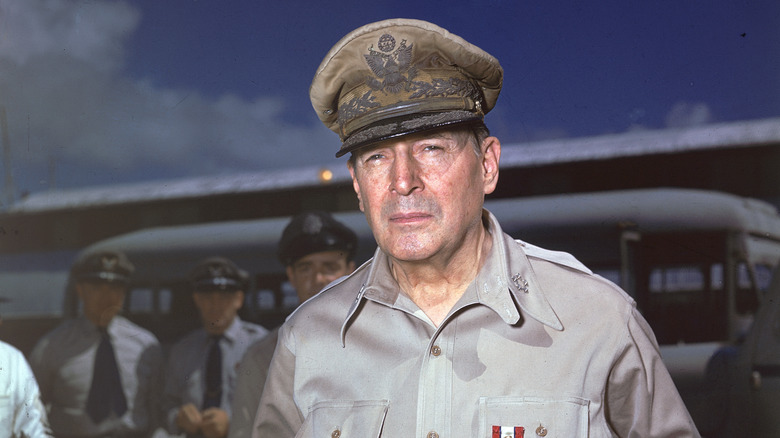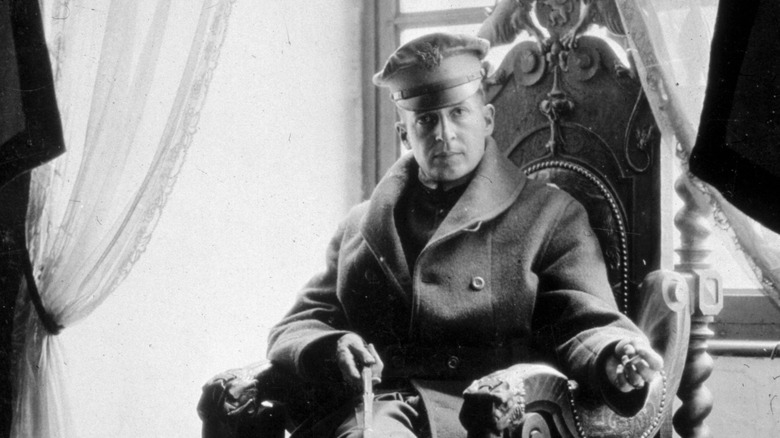The Untold Truth Of General Douglas MacArthur
In the pantheon of American military icons, General Douglas MacArthur is both one of the most famous and one of the most controversial. Brilliant, outspoken, and often difficult, MacArthur was one of just five U.S. military leaders granted the five-star rank of General of the Army during World War II — a rank that hasn't been conferred since 1950. Over the course of his five decades of military service, MacArthur was incredibly effective at managing large-scale military and logistical operations and self-promotion. He became a celebrated hero during World War II, and at one time was possibly the most famous and most popular living American.
MacArthur was born into a military family. His father, Arthur, had a storied military career, fought valiantly for the Union in the Civil War, and retired a Lieutenant General. MacArthur's mother, Mary, was from Virginia, and two of her brothers fought for the Confederacy. Often described as vain, overconfident, and dismissive of opposing opinions, MacArthur balanced his military brilliance with an arrogance that many found off-putting.
General MacArthur left behind a complex legacy, equal parts triumph and failure. His final command during the Korean War, and his arrogant defense of his actions tarnished his service record and changed public perception of him permanently. Here's the untold truth of General Douglas MacArthur.
General Douglas MacArthur was a brilliant student
Appropriately for a man who would serve in the military for most of his life, Douglas MacArthur was born in 1880 at the army barracks in Little Rock, Arkansas. According History, his earliest experiences were martial in nature, handling guns and learning to ride horses even before he learned how to read and write.
With a career military father, it's not surprising that MacArthur entered the U.S. Military Academy at West Point. MacArthur is remembered today as one of the greatest students the academy ever graduated. Not only did he graduate at the top of his class, in "American Caesar: Douglas MacArthur 1880 – 1964," historian William Manchester notes that he graduated with 2,424.2 points out of a possible maximum of 2,470, giving him a graduate score of 98.14%. Only two other graduates have ever scored higher, one of whom was Confederate General Robert E. Lee.
West Point isn't a normal university, of course, and didn't even confer degrees until 1933, but MacArthur's academic performance was undoubtedly off the charts. He had a perfect score in the subjects of law, history, and English and did exceptionally well in mathematics, as well as in all military-related subjects, such as gunnery and drilling. He accomplished all of this while enduring brutal hazing.
General Douglas MacArthur took controversial actions against the Bonus Army
The Great Depression almost brought the United States to its knees in the 1930s. Triggered in part by reckless speculation during the so-called Roaring Twenties, the stock market crash of 1929 brought unprecedented economic disaster. As reported by the Washington Post, it also brought about 20,000 unemployed World War I veterans and their families to Washington D.C. in 1932. Smithsonian Magazine explains that these veterans demanded that their military bonuses, enacted in 1924 but deferred until 1945 for budgetary reasons, be paid immediately — earning them the nickname the Bonus Army. The veterans set up camps around D.C. in order to pressure the government.
Efforts to force the Bonus Army to vacate their camps led to violence and rioting, and General Douglas MacArthur was ordered by President Herbert Hoover to clear the camps. By all accounts, MacArthur's handling of the Bonus Army was unnecessarily violent and heavy handed. He had tanks rolling through the streets and used tear gas and cavalry armed with bayonets to drive the starving veterans away.
Worse, according to "American Caesar," Hoover specifically ordered MacArthur not to cross the Anacostia River and attack the camp directly. MacArthur brazenly ignored the order and did just that, setting fire to the camp. The violence left two small children dead and many American citizens injured, but MacArthur swiftly organized a press conference where he gave Hoover credit for being decisive, forestalling any attempt to make him responsible.
General Douglas MacArthur held a rank in a foreign army
Generally speaking, the United States frowns on its military officers holding rank in a foreign country's army. General Douglas MacArthur not only did so, but also managed to get paid for his service in a big way.
After the 1932 Bonus Army debacle, General MacArthur continued to serve as U.S. Army chief of staff under a new president, Franklin D. Roosevelt. In 1935, the president of the Philippine commonwealth, Manuel Quezon, asked MacArthur to be the country's military advisor. PBS reports that MacArthur and Quezon were longtime friends, and that President Roosevelt gave MacArthur permission to serve in an advisory role.
That role shifted when, as explained by the Washington Post, MacArthur officially retired from the U.S. Army in 1937 to avoid reassignment. According to History, Quezon then gave MacArthur the rank of Field Marshal in the Philippines Army. Time explains that when the U.S. entered World War II, MacArthur was recalled to active duty, suffering a demotion as he went from a Field Marshal to a Major General overnight
But, according to PBS, some of the pain of that technical demotion was soothed when President Quezon secretly paid MacArthur about $500,000 for the "magnificent defense" he'd organized for the country. While MacArthur's acceptance of the money was most likely legal, it was kept secret until long after his death, and has since undermined his reputation.
General Douglas MacArthur paid off his mistress
Although General Douglas MacArthur is remembered in many circles as the ultimate patriot, a brilliant man who gave his life to selflessly serve his country, the man was far from perfect.
According to Esquire, MacArthur first met actress Isabel Rosario Cooper in Manila in 1930. MacArthur was fresh from a divorce and had recently been promoted to chief of staff of the United States Army. The two began an affair, and MacArthur arranged to have Cooper travel to Washington, D.C., where he put her up in a house and forbid her to ever go outside. He even went so far as to provide her with no outdoor clothing at all. In 1934, MacArthur grew tired of the affair and sent Cooper a plane ticket home. However, he didn't realize that the relationship had been sniffed out by journalists who MacArthur had sued for libel after his disastrous handling of the Bonus Army in 1932.
According to "American Caesar," a panicked MacArthur ordered his aide — a major named Dwight D. Eisenhower — to locate Cooper. When Eisenhower couldn't do it, two things happened: Cooper suddenly came into possession of $15,000, and MacArthur dropped his libel suit. As noted in "American Caesar," MacArthur wasn't married at the time, so his affair with Cooper wasn't really a problem legally or even in terms of his career, but MacArthur knew his mother would never approve, and was desperate to keep the affair from her.
General Douglas MacArthur returned to the Philippines
When World War II broke out, the Philippines had been governed by the United States since 1898. History notes that President Franklin D. Roosevelt issued an executive order in 1941, bringing all military forces in the Philippines under American control, and that he recalled Douglas MacArthur to active duty. MacArthur was made commander of all U.S. forces in the Philippines.
On December 8, 1941, a Japanese surprise attack destroyed all of MacArthur's air force. The Japanese then invaded, and MacArthur was forced to retreat to the Bataan peninsula, where his forces suffered tremendous losses. In March 1942, MacArthur was ordered to evacuate, leaving the Philippines to the Japanese. History Daily explains that MacArthur was reluctant to abandon a country he'd spent so much time serving, and vowed publicly "I shall return." Even in the midst of defeat, MacArthur's arrogance was consistent: In "Americans at War," author Stephen E. Ambrose notes that the Office of War Information had asked MacArthur to change his state to say "We shall return,' but MacArthur refused.
MacArthur wasn't grandstanding, however. He argued that the United States had a "moral obligation" to return to the Philippines, and in 1944 he won that argument, famously wading through the surf at Leyte as American forces began a counter-invasion to drive the Japanese out of the Philippines.
General Douglas MacArthur completely transformed Japan
After World War II ended, the United States occupied Japan until 1952. MacArthur, who had led the Allied forces in the Pacific, was the obvious choice to oversee the project of rebuilding and reshaping Japan. PBS reports that he was appointed supreme commander for the Allied Powers, but in reality he was basically an autocrat.
HistoryNet explains that MacArthur didn't try to micro-manage Japan — he left the existing government more or less intact. Instead, he sought to change Japan more fundamentally. He argued in favor of keeping Emperor Hirohito in power, at least symbolically, because he understood that the emperor was a powerful symbol, and Hirohito's cooperation with MacArthur's plans would carry weight with the population. At the same time, as explained by We Are The Mighty, MacArthur's decision to release an iconic photograph showing him towering over the diminutive emperor served to diminish Hirohito's power and stress American dominance without being confrontational about it.
MacArthur forced Japan to modernize. He insisted on enshrining civil rights and equality into the new constitution, granting women the right to vote in Japan for the first time. He made the emperor a figurehead, supported labor unions, and modernized property laws. The only area where MacArthur failed was religion: He wanted desperately to make Japan a Christian country.
General Douglas MacArthur was fired by the President
For all his talent as a military commander, the two most common words used to describe General Douglas MacArthur are probably "vain" and "arrogant." He was famously dismissive of contrary opinions. His former aide and future commander-in-chief, Dwight D. Eisenhower, once said that "MacArthur could never see another sun, or even a moon for that matter, in the heavens, as long as HE was the sun."
MacArthur's hubris had pushed him to flirt with insubordination many times — most notably, when MacArthur ignored a direct order from President Hoover not to engage the Bonus Army protesters in 1932. He quite simply didn't believe anyone knew better than he did.
According to History, when the Korean War broke out in 1950, MacArthur was immediately placed in charge of the conflict by President Harry Truman. MacArthur assured Truman that China would not get involved. He was proved wrong a few months later when China sent a huge force into North Korea, and MacArthur wanted to launch an all-out offensive — which Truman refused.
Smithsonsian Magazine reports that MacArthur began a very public campaign against Truman, his commander-in-chief. When his blatant insubordination began undermining the war effort, Truman took the unprecedented step of firing a five-star general. The dismissal was controversial, and pushed MacArthur's popularity sky-high in the U.S. He was given a ticker-tape parade, and was invited to address congress, where he made his famous "Old soldiers never die; they just fade away" speech.
General Douglas MacArthur wanted to be President
Thanks to being fired by President Harry Truman in 1951, General Douglas MacArthur will always be associated with insubordination. But he actually set the bar much higher several years earlier.
HistoryNet explains that while MacArthur was serving as the supreme commander of Allied Forces in the Southwest Pacific, he was also orchestrating a serious and organized effort to gain the Republican nomination for President of the United States. MacArthur despised President Franklin D. Roosevelt, and he thought he had enough support among the conservative wing of the party to capture the nomination — despite the fact that he was an active duty commander with a huge number of military forces under his command.
Defense Media Network explains that MacArthur failed to get the votes, in part because of the release of letters which showed his extremely conservative views. But he kept trying, failing again to claim the nomination in 1948. After he was fired by President Truman in 1951, MacArthur's personal popularity was at an all-time high, and he once again sought the nomination in 1952, despite being 72 years old and in declining health. But he was passed over again — this time by another wildly popular war hero: Dwight D. Eisenhower.
Heeding General Douglas MacArthur's advice would have avoided the Vietnam War
By 1961, Douglas MacArthur was 81 years old and a civilian. He was still regarded as a brilliant military mind, and few living Americans had served in the Pacific and Asia as extensively or as successfully as he had. Little wonder, then, that newly elected President John F. Kennedy invited MacArthur to the White House for a consultation about a spot of trouble brewing in Vietnam.
The American Conservative explains that the fact that Kennedy sought a meeting with a hard-line conservative like MacArthur surprised the liberal president's aides. But Kennedy had served in World War II in MacArthur's sphere of command, and he admired the general.
According to the Diplomat, MacArthur's advice was both surprisingly cautious and surprisingly prescient. He told Kennedy in no uncertain terms that the United States should not get involved in Vietnam, believing it could only lead to stalemate and a grinding, humiliating loss. In fact, he told Kennedy point-blank that "Anyone wanting to commit ground troops to Asia should have his head examined."
American and Vietnamese history may have been very different if President Kennedy had not been assassinated in 1963, and if the president had followed the old general's surprisingly brilliant advice.
General Douglas MacArthur planned his own death
According to American Heritage Magazine, General Douglas MacArthur famously hated doctors, but he remained robust and largely free from physical ailments for most of his life. In 1960, when he was 80 years old, MacArthur had surgery to remedy an obstructed prostate. The experience seems to have inspired MacArthur to consider his own legacy. As his health declined over the next few years, he worked on his memoirs, completing them just weeks before his death.
In 1964, when he was 84, MacArthur was diagnosed with biliary cirrhosis, caused in part by gallstones. MacArthur had suffered bouts of jaundice from his gallstones for years but had refused the simple surgery that could have corrected the problem and avoided this final disease. His initial surgery to remove his gallbladder was successful, but complications set in, and MacArthur died in the hospital on April 5, 1964.
General Douglas MacArthur was an overrated general
Despite General Douglas MacArthur's brilliant military career, his legacy has been hotly debated in the decades since his death. Some believe his reputation was exaggerated, and that MacArthur was an overrated general. Although he oversaw some highly successful operations during World War II, his decisions sometimes bordered on incompetence.
Time explains MacArthur left his air force sitting undefended on the tarmac for hours after the Japanese attacked Pearl Harbor. The entire fleet of planes was destroyed later that day, but could have been saved with some quick action. That disaster led directly to MacArthur being order to abandon the Philippines, leaving thousands of soldiers to a terrible fate. Later in the war, MacArthur seemed to waste lives, racking up thousands of casualties to capture the atoll of Peleliu, and then deciding he didn't need it after all.
History Collection reports that MacArthur's performance in Korea was similarly messy. After achieving a brilliant victory when his forces landed at Inchon and quickly captured Seoul and pushed the North Koreans to retreat, MacArthur arrogantly threw caution to the wind and pushed his army to advance quickly, thinking to end the war in a few weeks. As he'd been warned, however, the Chinese invaded with hundreds of thousands of troops and overran MacArthur's forces. The decision by President Truman to relieve MacArthur of his command was at least in part due to this completely avoidable disaster.
General Douglas MacArthur's legacy has faded
There was a moment in time when General Douglas MacArthur was easily one of the most famous and most popular men in the United States, if not the world. But after being relieved of duty by President Truman in 1951 and failing to capture the Republican nomination in 1952, Politico notes that MacArthur seemed to simply fade out of the public consciousness.
MacArthur's reputation has declined in part because his failures are better remembered than his successes. Many remember his insubordination against his commander-in-chief, but are unaware of brilliant military triumphs like Operation Cartwheel, when MacArthur moved his forces northward from Australia and outmaneuvered the Japanese, rendering their forces in the area largely impotent.
In some ways, MacArthur faded from the public's consciousness by choice. As reported by the Washington Post, after his retirement he moved into the Waldorf Hotel in New York City, where they lived more or less in seclusion. MacArthur spent some of his later years serving as the chairmanship of the Remington Rand corporation, according to History. True to one of his most famous speeches, it appears that General Douglas MacArthur chose to fade away.
